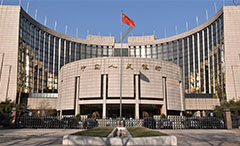PBOC takes steps to bolster liquidity
2018-05-19
China Daily
The People’s Bank of China, the central bank, has taken measures to bolster liquidity in the offshore yuan market by setting up more financing channels for offshore lenders participating in yuan-denominated businesses and initiating steps to improve cross-border capital flows.
A series of new measures were issued on the central bank’s website on May 18, allowing overseas yuan clearing banks and participating banks to tap liquidity from the onshore market by raising funds through interbank borrowings, cross-border account financing and interbank bond repurchases.
Overseas yuan clearing banks are required, at the same time, to provide plans for the yuan’s liquidity management and risk response.
The PBOC also pledged to implement bilateral local currency swap agreements to further facilitate cross-border trade and investment, while maintaining financial market stability.
The cash amount that should be reserved in the central bank’s branches in Shenzhen and Zhuhai, Guangdong province, was removed for yuan clearing banks located in Hong Kong and Macao, the notice said.
The central bank also plans to enhance overseas investors’ ability to use foreign currencies or the yuan for investment under the Shanghai-Hong Kong and Shenzhen-Hong Kong Stock Connect schemes, as part of an effort to facilitate cross-border capital flows.
The Hong Kong Monetary Authority issued a statement a few hours after the PBOC’s announcement, welcoming the new rules.
HKMA Chief Executive Norman Chan said: “As the yuan’s internationalization continues to progress and mutual access of capital markets between the two places further deepens, market demand for offshore yuan liquidity will increase.”
“The HKMA has all along maintained close dialogue with the PBOC to study measures to facilitate cross-border yuan fund flows. We believe that the new measures will help ensure the offshore market to continue to function orderly and efficiently, and support Hong Kong’s development as a global offshore yuan business hub,” he said.
The international financial market has seen rising volatility since April as the US dollar exchange rate and interest rate were going up, adding pressure to cross-border capital outflows and currency depreciation in emerging markets.
The HKMA bought HK$9.5 billion ($1.2 billion) overnight on May 17, marking the third-biggest intervention since the defense began in April, given the lower interest rate compared with the US dollar. It has spent a total of $7.95 billion to maintain a stable currency that has resulted in liquidity tightening.
A spokesperson from the State Administration of Foreign Exchange, the country’s top foreign exchange regulator, said that China’s cross-border capital flows remained stable in April, supported by a sound economic foundation.


